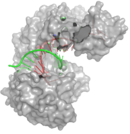Annual Review of Entomology (2020) 65, 293-311
From Pestinfo-Wiki
 | Selected publication you are invited to contribute to the discussion section (above tab) |
Mechanisms, applications, and challenges of insect RNA interference
Annual Review of Entomology 65, 293-311
Abstract: The RNA interference (RNAi) triggered by short/small interfering RNA (siRNA) was discovered in nematodes and found to function in most living organisms. RNAi has been widely used as a research tool to study gene functions and has shown great potential for the development of novel pest management strategies. RNAi is highly efficient and systemic in coleopterans but highly variable or inefficient in many other insects. Differences in double-stranded RNA (dsRNA) degradation, cellular uptake, inter- and intracellular transports, processing of dsRNA to siRNA, and RNA-induced silencing complex formation influence RNAi efficiency. The basic dsRNA delivery methods include microinjection, feeding, and soaking. To improve dsRNA delivery, various new technologies, including cationic liposome–assisted, nanoparticle-enabled, symbiont-mediated, and plant-mediated deliveries, have been developed. Major challenges to widespread use of RNAi in insect pest management include variable RNAi efficiency among insects, lack of reliable dsRNA delivery methods, off-target and nontarget effects, and potential development of resistance in insect populations.
(The abstract is excluded from the Creative Commons licence and has been copied with permission by the publisher.)
Link to article at publishers website
Database assignments for author(s): Kun Yan Zhu
Research topic(s) for pests/diseases/weeds:
control - general
Pest and/or beneficial records:
| Beneficial | Pest/Disease/Weed | Crop/Product | Country | Quarant. |
|---|